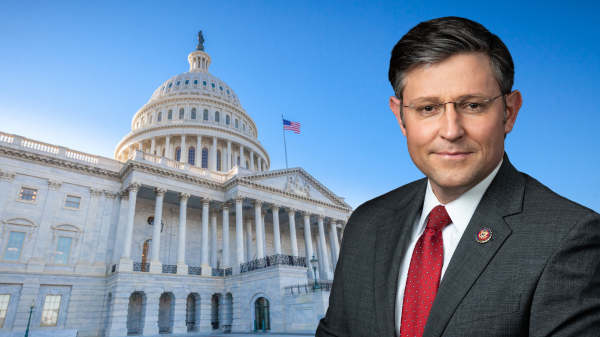Speaker vote suggests Republicans are finally ready to act like Democrats in the vote for Speaker Mike Johnson. (Opinion)
by S.T. Karnick
The House Republicans’ unanimous support for Rep. Mike Johnson (R-La.) in last week’s speaker vote may indicate that GOP lawmakers are finally ready to act like Democrats.
For taxpayers, that would be the best news in many, many years. Bringing Democrats’ level of enthusiasm, tenacity, and unparalleled political acumen to a fight for a smaller national government and a respect for individual rights might just save the nation — if anything can.
Johnson is a solid conservative and a constitutional scholar with lifetime ratings of 92% from the American Conservative Union and 90% from Heritage Action. In 2020, Johnson argued that states’ unconstitutional changes in voting procedures in a supposed response to COVID-19 invalidated their elector slates. He has consistently opposed federal government support of abortion and sex and gender radicalism.
Johnson voted against the bipartisan short-term spending bill that passed with near-unanimous Democrat support on September 30 (just one Democrat voted no) in an allegedly Republican-controlled chamber. He voted against sending $40 billion to Ukraine for warfighting last year and opposed another $300 million this year. Johnson has expressed agreement with the GOP budget hard-liners’ call for individual appropriations bills, while proposing another short-term spending measure to fill in the gap until those bills can be passed.
Johnson’s proposed approach would set up a stark conflict with the Democrat-majority Senate and spending fanatic Joe Biden. As that indicates, Johnson does not subscribe to the bipartisanship myth that has served as the basis for big-government uniparty rule for decades.
Johnson’s plan for budget negotiations fits with the hard-liners’ position and would draw a big fat line between the two parties’ positions on government spending.
“In Biden’s first two years, Johnson voted against a slew of bipartisan bills — including to establish a Jan. 6 independent commission, the infrastructure law, reauthorization of the Violence Against Women Act, a modest new gun law and the CHIPS and Science Act,” NBC News reported. In addition, “He voted against bipartisan legislation to codify same-sex marriage, which Biden signed into law in 2022” and “has a spotless history of voting against legal abortion,” NBC News observed.
“Johnson isn’t known for bipartisanship,” the Wall Street Journal reported. “He was ranked 429th out of 435 lawmakers in the 2021 bipartisan index kept by the Lugar Center and the McCourt School of Public Policy at Georgetown University, situated among members of the staunchly conservative House Freedom Caucus.”
Bipartisanship is the central pillar of ever-expanding government. The uniparty scam starts with Democrats demanding ambitious schemes of government spending and regulation, which the chattering classes characterize as laudable idealism and wise “investments.” Republicans resist based on the cost to taxpayers, which the media bigmouths invariably castigate as small-minded and miserly.
If the Democrats have a legislative majority and the presidency, they then just do what they want. The extravagant Affordable Care Act and Inflation Reduction Act were passed with all Republicans voting no (and with all Democrats voting yes in the latter case), then signed by Democrat presidents. The American Rescue Plan Act of 2021 fiscal stimulus boondoggle passed with unanimous support from Senate Democrats and only one House Democrat voting against it.
Republicans can stick together at times, as in the case of the Tax Cuts and Jobs Act, but they usually do so only when they cannot win, as happened with the American Rescue Plan. Democrats consult with Republicans only when they need votes from GOP turncoats, as when Senator John McCain (R-Ariz.) single-handedly rescued Obamacare from partial repeal.
This year’s budget bills show how the game can change. A small group of Republican House members have prevented GOP leaders from colluding with the Democrats to put off a reckoning about the appalling $2 trillion federal budget deficit until after next year’s elections, which would obviously help protect big spenders from voter scrutiny. The budget hard-liners would force the Democrats to accept sole responsibility for that catastrophic, unprecedented budget hole.
Johnson’s plan for budget negotiations fits with the hard-liners’ position and would draw a big fat line between the two parties’ positions on government spending. If that approach risks producing Democrat majorities in both houses of Congress in next years’ elections, the nation would have been lost anyway via Republican capitulation to fiscal suicide. In any case, I do not believe that the public knowingly supports such idiocy. Republicans’ complicity in uniparty rule hid the truth.
The split among congressional Republicans reflects a great divide among the American people over whether to support the ever-expanding mega-alliance of big government, big money, big business, and big media, aligned with the nation’s so-called cultural and educational institutions, which are just a big brainwashing outfit doing the plutocrats’ bidding.
To me, those 22 days without action from Congress during the speaker deliberations were the best governing we’ve had for quite a while. If Johnson and the budget hard-liners can transform their party from a surrender caucus into a group that fights like Democrats, this nation might just have a chance of surviving beyond 2024.
Originally published by Blaze Media. Republished with permission.
For more Budget & Tax News.
